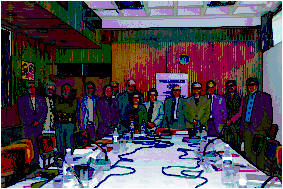(1) Civil society (CS) has a definite role in
improving governance. However, though active in various spheres, it is
still an amorphous entity and needs to be structured, particularly at
the lower levels, to be effective.
(2) C.S. should do some capacity building, and flag concrete steps to
improve governance.
(3) Greater interaction with political and administrative apparatus by
CS is essential.
(4) There is need for an apex body of CS to keep direction and focus.
(5) C.S. should endeavour to act as the voice and conscience of the poor
and marginalised and not be deterred by lack of response from the
authorities.
(6) Improvements in delivery system, use of technology, speedy and
deterrent punishment by simplifying the procedures of delivery system
was suggested for minimising mis-governance and misconduct.
(7) It was felt that mere legal and procedural measures will not be
enough. There is need to recreate the societal and traditional values
from school level itself in which civil society can play an important
role.
(8) It was also felt that there are enough people in all walks of life
whose services can be harnessed by the CS to pressurise govt. to improve
matters.
(9) There was also a need to be discerning in public discourse to
support honest and effective politicians and civil servants. C.S. should
not indulge only in negative criticism painting everything in black. C.S.
should also emphasise the positive and in poverty alleviation play the
role of a stake-holder and not of a patron.
(10) Several participants emphasized the importance of Communitisation
of delivery system at the cutting edge level by making the actual
stake-holders responsible for running it. It has been successfully
experimented in Nagaland.
(11) The most emphasised point was that the C.S. should not feel
discouraged by lack of response but keep the pressure by continuous
activities, by way of petitions, delegations, demonstrations, extensive
use of RTI, recourse to legal actions and publications. Demonstrative
actions are more fruitful than mere article writings.
(12) It was also decided to forward the recommendations to the govt. and
circulate it widely among academics, NGO’s, civil society entities and
other interested groups.
